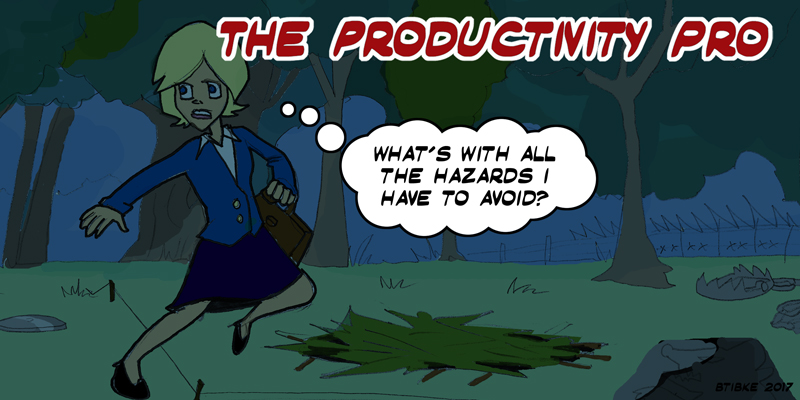
“If you spend too much time thinking about a thing, you’ll never get it done.” – Bruce Lee, Chinese actor and martial artist
Mistakes are the inevitable fruit of trying new things, and sometimes they even produce something useful. A biological mistake may prove life-saving to an organism if the environment changes suddenly, and you can even frame some business mistakes as solutions. Silly Putty started life as a failed attempt at synthetic rubber but became a ubiquitous child’s toy, which is still sold today.
We all must make mistakes to refine our work processes, if only to discover what doesn’t work. That doesn’t mean you have to waste time when hordes of other people have already made certain mistakes for you. Here’s a brief list of productivity mistakes to avoid:
-
Under-planning. Unless you’re already an expert on what you’re doing, don’t start before you’ve lined up your ducks. Even if you are an expert, have at least an outline or standard procedure in mind. If nothing else, go through the expected project point-by-point and decide how you’ll handle each stage. Once you’ve done your due diligence and put some care into it, dive in.
-
Overthinking/Perfectionism. There’s a line between under- and overthinking. It’s neither a fine line nor a plateau, but there’s definitely a sweet spot between the two extremes—and if you stray over the edge of too much planning or thinking, you may never get started. Planning is necessary, but you must know when to cut it off and get moving. Perfectionism and overthinking can both stall you in the paralysis of analysis. You also get the added bonus of anxiety, stress, and depression as you fall farther and farther behind.
-
Overemphasizing morning efficiency. Most productivity literature assumes we all have greater energy early in our shifts, a few hours after we wake up. That’s when you’re supposed to work on the hard stuff and “eat your frogs” (the ugliest first, if you have two). Well… maybe not. Think about how slowly many offices are to get started; some don’t get into full swing for a couple of hours. And consider this: the stress chemical cortisol spikes early in the morning (assuming the classic 9-5 shift). This may be why one infographic recommends avoiding coffee until after 10 AM, when cortisol levels drop. Furthermore, not everyone has an energy peak early in their workday. Some people do best later in the day, even toward the end of the afternoon. Learn your peak energy times and use them to your advantage.
-
Poor prioritization. Instead of piling everything together and treating all tasks as equal, triage them ruthlessly, eliminating everything unimportant or that you can get (or hire) someone else to do. Prioritize the rest in rigid order. Comparatively minor tasks go at the bottom of your list, where they can fall off if needed. Items due very soon go to the top of your list, with important but non-crucial tasks in the middle. Work the top-priority tasks during your energy peaks, and any other times you can manage them. Try to limit top-priority tasks to no more than three (very difficult at first).
- Lack of natural light. Avoid working in a windowless space if possible; humans weren’t meant to work in artificially-lit boxes. A study published in the Journal of Sleep Medicine in 2014 indicates exposure to natural light significantly boosts your alertness and mood. If you can’t sit near a window, buy a SAD lamp for your workspace—that is, a lamp designed to treat Seasonal Affective Disorder.
Make Your Own Mistakes
Avoiding the mistakes listed here will give you a head start on productivity, but it doesn’t mean you won’t make other mistakes. They’ll just be different ones. Time management methods that work great for others may not work for you, but at least this head start gives you time to make your own mistakes without piling on the others, too.
About Laura Stack, your next keynote speaker:
© 2019 Laura Stack. Laura Stack, MBA, CSP, CPAE is an award-winning keynote speaker, bestselling author, and noted authority on employee and team productivity. She is the president of The Productivity Pro, Inc., a company dedicated to helping leaders increase workplace performance in high-stress environments. Stack has authored eight books, including FASTER TOGETHER: Accelerating Your Team’s Productivity (Berrett-Koehler 2018). She is a past president of the National Speakers Association, and a member of its exclusive Speaker Hall of Fame (with fewer than 175 members worldwide). Stack’s clients include Cisco Systems, Wal-Mart, and Bank of America, and she has been featured on the CBS Early Show and CNN, and in the New York Times. To have Laura Stack speak at an upcoming meeting or event, call 303-471-7401 or contact us online.
Here’s what others are saying:
“What I enjoyed most about your presentation was that it was not only engaging but also practical in application. I’ve read everything from Covey’s system to “Getting Things Done,” and you presented time management in a way that is the easiest I’ve seen to digest and apply. Thank you for helping our system today!”
—John-Reed McDonald, SVP, Field Operations, Pridestaff
“Laura is an incredible speaker who takes practical information to improve productivity and efficiency and makes it interesting and fun! She has a great sense of humor and completely engaged our corporate and sales team. Laura motivated everyone to take steps to make their lives more productive and efficient.
—Molly Johnson, Vice President Domestic Sales, Episciences, Inc.
“Ms. Laura Stack’s program received the highest scores in the 13-year history of the Institute for Management Studies (IMS) in Cleveland! From the 83 participants, the workshop received a perfect 7.0 for “Effectiveness of the Speaker” and 6.8 for “Value of the Content.” Managers especially valued learning about task management, how to minimize interruptions, organizing with Outlook, prioritizing, effectively saying ‘no,’ how to set boundaries, and recognizing self-imposed challenges to time management.”
—Don Gorning, Chair, Institute for Management Studies Cleveland


